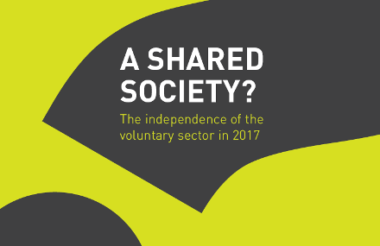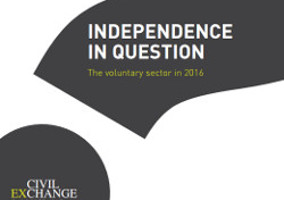The commissioning and regulatory environment is continuing to discourage charities from campaigning, according to the latest review of the situation from Civil Exhange published today.
The think tank has called on the Prime Minister, Theresa May, to learn from past failures and take improve the situation by “signing up to an effective, externally and independently policed and properly funded Compact”.
Writing in the foreword to the think tank’s latest report, A shared society? The independence of the voluntary sector in 2017, Sir Roger Singleton said: “What particularly strikes me over the last 12 months is the chilling – indeed sometimes freezing – effect on the independent voice of the sector, not helped by what the report describes as ‘a profound muddiness’ about what is acceptable on campaigning.”
The report says that the situation has been made worse by the continued existence of Lobbying Act, gagging clauses in contracts, how the Charity Commission handled guidance on European Union referendum and introduction of new government grant standards.
It is the sixth in a series of annual health checks started by the Panel on the Independence of the Voluntary Sector and continued by the think tank, Civil Exchange. The report is supported by the Baring and Lankelly Chase Foundations.
Each year the report has warned of threats to the independence of the voluntary sector.
Caroline Slocock, director of Civil Exchange, said: “The Brexit watershed could herald a significant shift a chance for the voluntary sector and government to work together to give more power to those in society who currently have little influence over - or trust - in government as it runs now – but only if government learns critical lessons from the failed Big Society initiative.
“The evidence so far is not promising and, as our latest report clearly shows, the independence of the voluntary sector, which must lie at the heart of a truly shared society, continues to be under serious and growing threat, despite some positive developments over the last 12 months.”
Criticism of new grant standards
It adds that the grant and commissioning environment has also contributed to the problem.
“Over the last 12 months, the situation overall has become worse, despite some positive developments,” the report says.
It says the new grant standards, announced in December, mean grants are “becoming more like contracts” and said: “Whilst the move to reduce the risks uncovered by the case of Kids Company has to be welcomed, this looks like overkill.”
The report said that the new grant standards, which were introduced in place of a controversial proposed anti-advocacy clause, included “significant concessions” for the sector but criticised NCVO, Acevo and Social Enterprise UK for being too enthusiastic about the new agreement.
“The reaction of these sector leaders seemed to paper over some very significant cracks, potentially conceding important points of principle and practice,” the report said.
It highlights that in January other sector bodies, including Navca, the Directory of Social Change, Children England, Clinks, Grants for Good, the Lloyds Bank Foundation and the Charity Finance Group, still had concerns that the new terms were not compliant with the Compact, and that they had written to the Ben Gummer, minister in the Cabinet Office.
Civil Exchange also highlights that grants from the Tampon Tax Fund, which were announced in December, included restrictions on campaigning.
Role of regulation
The report is also critical of the Charity Commission’s activity in 2016.
Civil Exchange said the Commission’s initial version of its EU referendum guidance “discouraged charities from speaking up” and “contributed to a major chilling – indeed freezing – effect”.
It also noted ongoing anxiety about how the Commission might use some of its new powers.
Five point challenge for the Prime Minister
Civil Exchange also warned that the Compact – the partnership agreement between the government and voluntary sector which has been in place since 1998, committing the government to consult the sector and enable it to campaign – is “not being effective”.
It concluded that: “It’s time for the government to take a fresh look at what kind of relationship it wants to establish with the voluntary sector in the light of Theresa May’s commitment to a shared society, to make sure that actions match public words and to restore trust in the sector’s independent regulation.”
Civil Exchange has now issued a “five point challenge” to the Prime Minister:
- Making a clear statement about the legitimate role of campaigning and the importance of the voice of the voluntary sector in helping to shape policies and services, regardless of financial relationship;
- Providing a genuine seat at the table of policy-making and service design for the social sector, nationally and locally;
- Providing effective funding that allows the sector the operational freedom to deliver services that work and capacity to engage in policy-making, particularly for those organisations working with disadvantaged groups.
- Ensuring proper, affordable access to the courts for NGOs, reversing recent changes.
- Signing up to an effective, externally and independently policed and properly funded Compact.
Related articles












